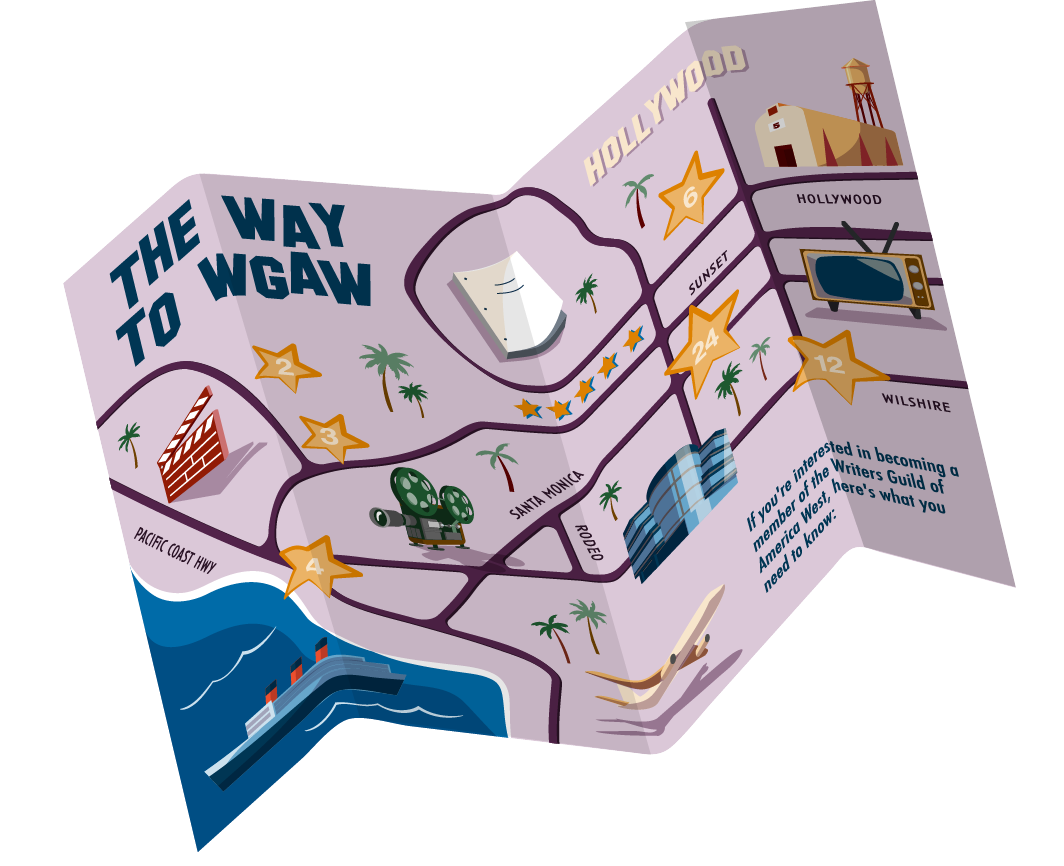Members
Updated December 18, 2025
Artificial Intelligence (“AI”) has become a key issue for the Guild and the entertainment industry broadly, with potential implications for the employment and compensation of many creative workers. The 2023 MBA established groundbreaking AI protections for writers; the WGAW will strongly enforce these new MBA provisions. In addition, the WGAW is engaged in policy advocacy against the theft and exploitation of writers’ works by AI models.
2023 MBA Provision
The 2023 MBA established regulations for the use of AI on MBA-covered projects in the following ways:
- Neither traditional AI (technologies including those used in CGI and VFX) nor generative AI (GAI, meaning artificial intelligence that produces content including written material) is a writer, so no written material produced by traditional AI or GAI can be considered literary material.
- If a company gives a writer written material produced by GAI that hasn’t been previously published or exploited, that material doesn’t count as assigned material (for compensation purposes) or source material (for determining credits), and can’t be used to disqualify a writer for separated rights. In other words, a company can’t give you an AI-generated screenplay and pay you a rewrite fee—you would be treated as the first writer of the screenplay.
- A writer can choose to use AI when performing writing services if the company consents and the writer follows any applicable company policies. But the company can’t require the writer to use AI software (e.g., ChatGPT) when performing writing services.
- The Company must disclose to the writer if any materials given to the writer have been generated by AI or incorporate AI-generated material.
- The WGA reserves the right to assert that exploitation of writers’ material to train AI is prohibited by MBA or other law.
In addition, the companies agreed to meet with the Guild to discuss their use and intended use of AI. Read the MBA’s AI provision in the 2023 Memorandum of Agreement.
Contact the Guild
If you have encountered AI in the course of your WGA-covered employment, including if you have been asked to use AI or have been provided with AI-generated material, please contact the WGAW’s Research & Public Policy Department.
See our guide to Writers and Artificial Intelligence for more on AI rights and responsibilities.
If you are asked to consent to AI transcription during a pitch meeting, including on Zoom, you should refuse. Transcribing a writer’s pitch is the equivalent of demanding that a writer leave free written material behind. For more information on transcription and free work, please visit the Screenwriters Handbook and No Writing Left Behind.
All press inquiries regarding the WGAW’s position on AI should be sent to Communications.
AI Advisory Committee
The WGAW Board has appointed an AI Advisory Committee, co-chaired by Deric Hughes and John Rogers. WGAW members can send a message to them through this form to follow on-the-ground writer experiences with AI, provide the Guild with insight on the implications of AI development for the profession, and communicate with Guild staff who regularly track and engage on AI issues.
Guild Action on AI
The WGAW monitors developments related to AI technology and its use in the industry, and engages on AI policy to advocate for writers’ interests. Check out some of WGAW’s recent AI policy actions:
- On November 26, 2025, WGAW joined WGAE, SAG-AFTRA, AI Coalition for Data Integrity and others in filing an amicus brief in Reuters v. Ross Intelligence, supporting the plaintiff’s argument and the U.S. District Court’s decision that AI training using copyrighted material without consent is not fair use.
- WGAW submitted a letter of support for California Assembly Bill 412, introduced by Assemblymember Rebecca Bauer-Kahan in February 2025. The bill requires AI developers to provide copyright owners with information about how their materials have been used to train generative AI models.
- On December 11, 2024, the WGA sent this letter to the CEOs of Warner Bros. Discovery, Disney, Paramount Global, NBCUniversal, Sony, Netflix, and Amazon MGM Studios to stop AI theft of writers’ work.
- WGAW submitted a response to the European Union’s multi-stakeholder consultation on general-purpose AI models under the EU AI Act in September 2024.
- WGAW endorsed the Generative AI Copyright Disclosure Act, sponsored by Representative Adam Schiff (D-Calif.), which was introduced in April 2024. The bill requires AI developers to disclose all copyrighted works used in building or altering training datasets for AI models.
- WGAW co-signed a March 2024 letter to Senate Majority leader Chuck Schumer (D-N.Y.) with The NewsGuild-CWA, Writers Guild of America East, and National Association of Broadcast Employees and Technicians-CWA.
- WGAW and WGAE filed a joint comment with the U.S. Copyright Office in their Copyright and AI Inquiry in October 2023. Through WGA’s comment submission form, over 400 hundred WGA members also provided comments in this proceeding.
A.I. Guide
Writers and Artificial Intelligence
See our guide to Writers and Artificial Intelligence for more on AI rights and responsibilities.





